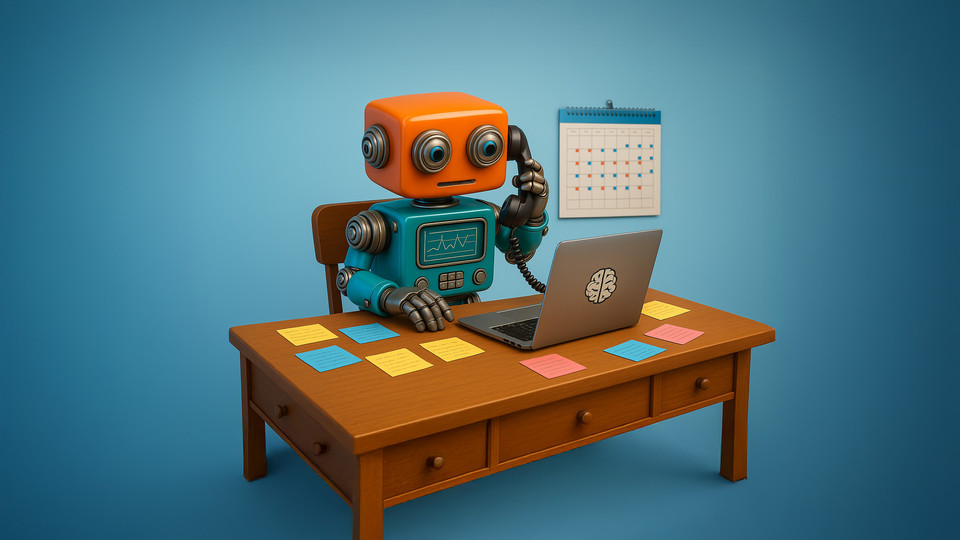Sep 23, 2025 Michael Dannhauer
ShareAI agents are digital assistants that can independently plan tasks, use tools, and automate complex processes. They facilitate natural interaction with software and provide support in areas such as production, personnel planning, and customer service. This article will explain how AI agents work, their advantages, limitations, and challenges in further development. Learn how companies like INFORM are using AI agents to streamline processes and discover how this technology will transform the way we interact with intelligent systems.
What is an AI Agent?
AI agents are digital assistants capable of taking action. They combine the linguistic capabilities of modern large language models (LLMs) with planning, decision-making, and execution mechanisms. The result is systems that can independently take on tasks, automate processes, and actively support humans in making complex decisions. In practice, however, agents typically operate semi-autonomously within clearly defined processes and under human supervision. While fully autonomous operation is technically possible, it is rarely sought after.
Previously, language models such as ChatGPT and Google Gemini responded only to individual inputs and did not remember previous conversations. This has now changed; modern models have advanced context and memory functions. They can store and retrieve information from previous conversations and incorporate it into new responses. This enables more continuous, personalized communication. Nevertheless, one important difference remains: AI agents combine these linguistic abilities with mechanisms for planning, executing, and using external tools, thus surpassing pure language models. They can plan intermediate steps, select the appropriate tools for a task, and apply them in the correct order. This transforms a reactive system into a proactive problem solver — a true digital assistant.
Background and Context: Where did the idea come from?
The first theoretical concepts for AI agents date back to the 1950s and '60s when computer scientists like John McCarthy and Marvin Minsky started modeling how machines think and behave. The first software agents that executed simple decision rules emerged in the 1980s, primarily in robotics, systems control, and simulation. Later, with the advent of the Internet, intelligent agents were used to filter information and automate user tasks, among other things.
However, the real breakthrough came with the combination of modern artificial intelligence and large language models. This combination enables agents to be designed not only on a rule-based basis but also to be capable of learning, context-sensitive, and linguistically interactive. One impressive example is the "Smallville" project, in which AI agents with individual goals and memories interacted with each other in a virtual city and developed complex behavior. This experiment demonstrated the potential of such systems.
How does an AI agent work?
The foundation of an AI agent is typically a robust language model enhanced by "tool use" capabilities. This means the agent can access and control external tools, such as databases, email systems, and analysis functions.
AI agents are characterized by features that distinguish them from traditional automation. Depending on the application area, an AI agent can combine a varying number of functions.
- Linguistic interaction: Communication via language becomes the central control instrument. This applies to both human-machine and machine-machine interaction.
- Adaptability: During a session, agents learn from previous tasks, interactions, and facts and adapt to new situations.
- Planning skills: Agents independently create and revise plans to achieve goals. The goal can be specified and adjusted as needed.
- Multitasking ability: Agents process information from different sources in parallel.
- Tool integration: They can act directly in operational systems via APIs or interfaces.
- Action model: The agent performs specific actions, such as delegating a task or initiating a change in a planning tool.
From a technical perspective, AI agents are created through the interaction of several components:
- Prompt engineering: This allows for targeted control of the language model.
- Tool wrapping: the integration of external functions.
- An execution loop, which is a control loop in which the agent monitors its progress and replans if necessary.
- Memory and context management, e.g., via vector databases or dedicated memory structures.
Application at INFORM
INFORM develops AI agents that can be seamlessly integrated into existing software solutions. The goal is to enable control of even complex processes using natural language, regardless of the user's prior knowledge.
For example, in personnel planning, an agent can respond independently to requests such as "List the employees who called in sick today" or "Find replacements for Team A," including accessing databases, filtering by team membership, and suggesting rescheduling options.
In the near future, the agent could take action on its own initiative, create a report on the personnel situation, and provide specific recommendations. Users would not have to click through menus or lists.
Such agents are also conceivable in production. For instance, when a production manager asks, "Why has my delivery reliability dropped?" the agent can automatically analyze the cause, visually present the results, and suggest measures.
The key point is that these capabilities can be used for more than individual tasks. In an agent network, or swarm, they can support and coordinate complex, company-wide processes.
Specialists instead of generalists: Agent Swarms
Agents don't have to be able to do everything. It is much more effective to create specialized agents that focus on clearly defined areas of responsibility, such as data analysis, report generation, or customer communication.
These agents can communicate with each other, delegate tasks, and share results. This creates a scalable, adaptable, and fault-tolerant swarm of agents.
Advantages and Disadvantages of AI Agents
Advantages
- Automation of complex tasks: AI agents can independently plan and execute multi-step processes.
- Natural interaction: Voice control makes access easier, even for non-technical users.
- Learning ability: Agents improve with continuous use and adapt to new requirements.
- Employees' workload is reduced. Standard tasks can be delegated, leaving more time for strategic activities.
- Flexibility: Agents can be trained for specific tasks and integrated into existing systems.
- Scalability: Agent swarms can coordinate large, complex processes.
Disadvantages
- Explainability: Agents' decisions are not always transparent or traceable.
- Dependence on data access: Without structured, up-to-date data sources, many functions are limited.
- Development and integration costs: Building reliable agent systems requires technical expertise and investment.
- Security risks: Improper access to systems or faulty automation can lead to problems.
- Limited generalization: Agents often only work well within their narrowly defined areas of responsibility.
- Legal and ethical issues: Data protection and liability must be clearly regulated. Additionally, it must be ensured that an AI agent delivers neutral, fair, and non-discriminatory results.
FAQ about AI Agents
Do I need programming skills to use an AI agent?
No, modern AI agents are designed to be operated using natural language. No technical knowledge is required to use them; however, IT expertise is necessary for developing or customizing an agent.
How long does it take for an AI agent to be ready for use?
That depends on the use case. For simple tasks with existing interfaces, an agent can be configured in a few days. However, complex, company-specific scenarios with many data sources and individual requirements can take several weeks to months, including testing and customization.
Are there ready-made AI agents, or must each one be developed individually?
Both are possible. There are standard solutions for tasks such as text analysis and appointment management. There are also customized agents that are specifically adapted to a company's processes, such as those developed by INFORM..
Which industries benefit most from AI agents, and why?
Industries such as logistics, manufacturing, financial services, human resources planning, and customer service benefit the most because they must process large amounts of data daily, make many decisions under time pressure, and coordinate complex processes. AI agents help employees find relevant information faster, prepare decisions, and automate routine tasks without having to manually search through systems or constantly switch between applications.
Conclusion
AI agents are taking human-machine collaboration to a whole new level!
They will transform many work processes in the coming years. Therefore, INFORM is actively developing these technologies to create more intuitive, intelligent, and efficient software solutions.
About our Expert

Michael Dannhauer
Michael Dannhauer has been working in corporate marketing at INFORM since 2002 and deals with topics related to the optimization of business processes using AI.

